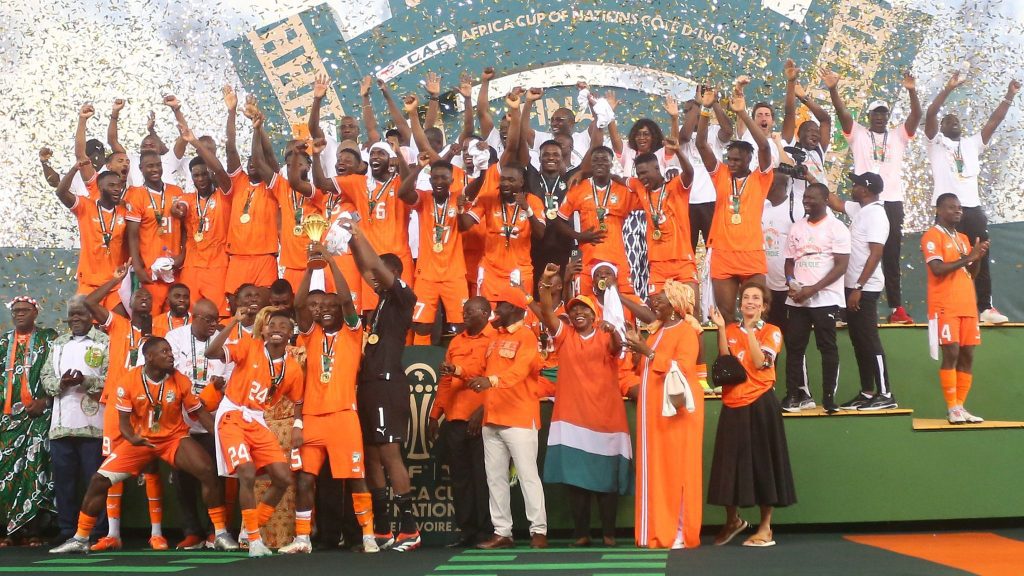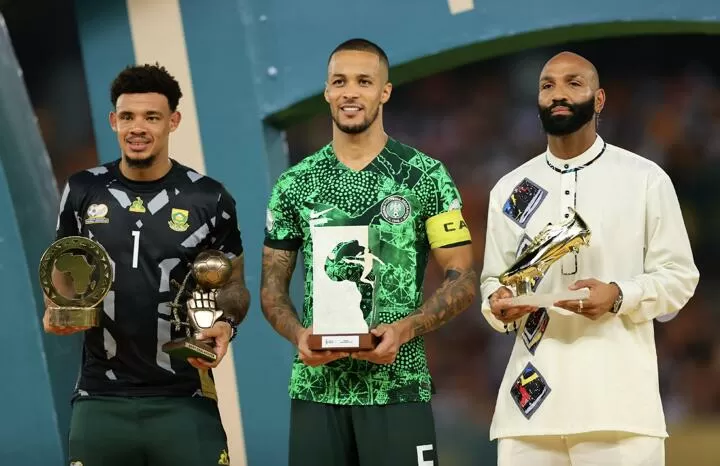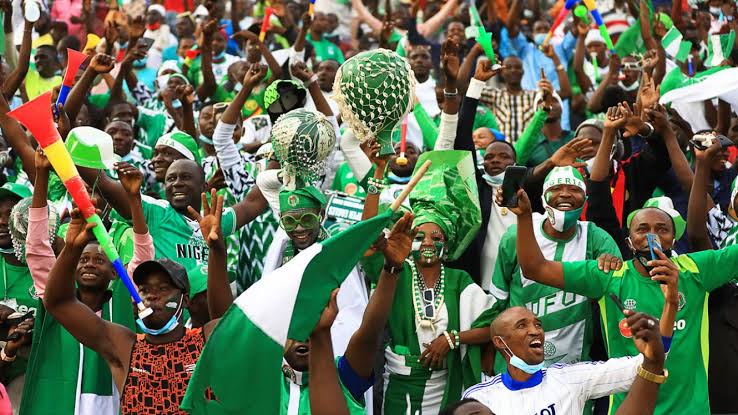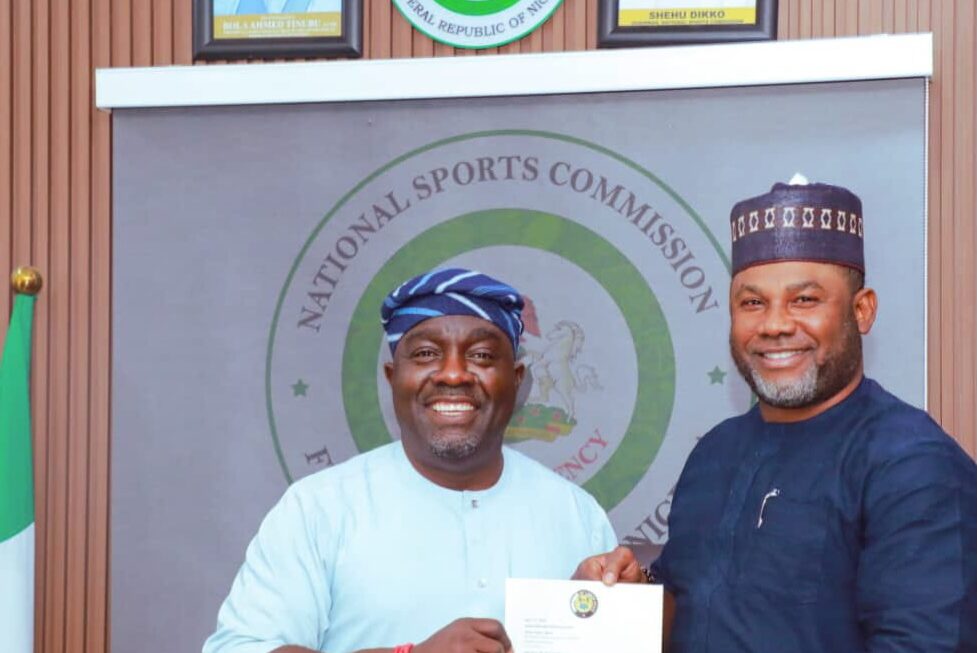Host Cote d’Ivoire on Sunday February 11, 2024, emerged as new African champions in football, as the curtain was drawn on the 34th edition of the TotalEnergies African Cup of Nations (AFCON 2023), after beating Nigeria 2-1 at the Stade Olympique Alassane Ouattara.
The 34th edition of the African Premier Soccer competition introduced in 1957 as a biennial competition, as usual, sustained the beauty of African football, laced with its culture and tradition, interesting and remarkable moments, results, affiliation and association, as well as the technicalities, including, but not limited to officiating, which gives credence to the re-examination of Video Assistant Referee (VAR), especially in Europe.
Apart from setting standards for the continent against other continents, the carnival-like side attractions brought out the uniqueness of football in Africa. From January 13th to February 11th, 2024, attention of world football was focused on Africa, where football was adopted as ‘Religion’, albeit temporarily’.

Again, Africa was able to stamp its relevance in world football, catching attention right from the withdrawal of its major stars from top leagues in Europe and other continents, to enhance the reputation of the Black Continent in football, and equally, though circumstantial, sticking to the January/February calendar for the competition, against the interests of Europe.
Although the tournament retained its original 2023 branding, it was moved to January–February 2024 upon Cote d’Ivoire’s request, in order to avoid the West and Central African tropical rain season, which typically reaches its peak around June–July.
The 2025 AFCON, which will be the 35th edition of the biennial African football tournament will be hosted by Morocco for the second time and the first since 1988 in June and July 2025. Unlike the previous AFCON tournament, the 2025 finals is expected to be held in June and July, the Northern hemisphere’s summer months.
Cote d’Ivoire, arguably the tournament’s wonder team came from behind to defeat Nigeria and earn a third Africa Cup of Nations title.
Pipped by the same Super Eagles in their second match of the competition and then routed 4-0 by Equatorial Guinea, the 1992 and 2015 champions only managed to limp into the knockout rounds as the lowest-ranked of the best four third-placed teams. However, they improved steadily in the campaign by first throwing out Cup holders Senegal, and then saw the back of neighbours Mali in the quarter-finals, and that of the Democratic Republic of Congo in the last four.
They were the abject underdogs going into Sunday’s final against a Nigeria side that discovered an impregnable shape and played with courage, confidence and conviction. Roared on by over 57,000 fans at the Stade Olympique Alassane Ouattara, the Elephants jettisoned the form books and took the fight to the Super Eagles from the first blast of the whistle.
Another surprise was that it was the Assistant Coach of Cote d’Ivoire, Emerse Fae that guarded the team to victory, following the sacking of Head Coach, Jean Louis Gasset. The Frenchman was sacked after their 4-0 defeat to Equatorial Guinea. That was the Elephants’ heaviest home defeat in history, leaving them on the brink of being eliminated in the group stages.
Altogether, seven coaches were either sacked or resigned the competition intensified, with the sacking of Gasset been the first.
Football associations were forced to take strict actions following the woeful and unprecedented poor run of form of their sides in the competition.
The resignation as well as dismissal of coaches in the just concluded edition of AFCON has been unprecedented with the number of coaches being replaced on the high side. It’s a competition that always put coaches and Associations to test, as agreements for the elongation or otherwise of future contracts are normally tied to performance and results.
Egypt sacked Portuguese head coach Rui Vitoria following The Pharaoh’s shocking exit from AFCON 2023. The Egyptian Football Association (EFA) in an official statement released on Monday, February 5, 2024, announced the dismissal of Rui Vitoria as the head coach of the Egyptian national team following their elimination from the Africa Cup of Nations.
Tanzania’s Adel Amrouche sacked after receiving an 8-match ban for distasteful comment about Morocco at AFCON 2023. The Tanzanian Football Association was the first to announce the sacking of the team’s head coach who had received an 8-match ban from CAF following his shocking comments about the World Cup 2022 semi-finalists, Morocco at AFCON 2023.
Adel Amrouche was dropped as the head coach of Tanzania after the 3-0 defeat at the hands of Morocco with many of the opinion that the real motive behind the sack of the Algerian-born coach was as a result of the statements he made about Morocco before the commencement of AFCON 2023.

The Ghana Football Association also released an official statement confirming that Chris Hughton, the head coach of the Black Stars of Ghana, was sacked. The statement was released in the early hours of Wednesday, January 24, 2024, and also announced the dissolution of the technical team. The decision was made following Ghana’s poor performance at the AFCON 2O23.
Hughton took over as head coach in 2023 and led the team to their first competitive stage at AFCON. Unfortunately, Ghana had one of their worst campaigns in AFCON 2023, which was disappointing considering the rich history of the Black Stars.
On Tuesday, January 23, 2024, Gambia’s hopes of winning the Africa Cup of Nations were shattered as they faced a dramatic exit from the tournament. The Scorpions’ final game in Group C against Cameroon ended with a score of 3-2 in favour of their opponents, which led to the decision of their 50-year-old Belgian coach, Tom Saintfiet, to resign from his position.
Despite creating a lot of excitement among fans and pundits alike, Gambia’s performance in the tournament was disappointing as they failed to secure any points and finished at the bottom of the group.
Algeria dismissed their head coach Djamel Belmadi immediately following their elimination in the group stage of the competition. Algeria lost unexpectedly to Mauritania 1-0 and drew twice against Angola and Burkina Faso, finishing last in the group with only two points.
Djamel Belmadi took to his social media platform to confirm the departure in a now translated message that read, “We apologize to the fans of the national team and the Algerian people, and we regret the way the warriors showed in the African Cup of Nations and the bitter exit from the first round, after we worked hard and provided ideal conditions for our players to shine and achieve the goal. Sorry again to the millions of Algerians who love their national team and will certainly not abandon it in the upcoming elections.”
In a surprising turn of events, head coach Jalel Kadri announced his departure from the Tunisian national football team following a disappointing AFCON 2023 campaign. Tunisia, who was considered one of the favourites to win the tournament, finished last in their group, failing to win a single match.
Guinea-Bissau coach Baciro Cande also lost his role after the country’s federation confirmed his deal won’t be renewed when it expires in March. Guinea-Bissau became the first country to be eliminated from the 2023 edition in the group stages.
AFCON 2023 was also a platform for former African stars to flex and also support their various countries from the sideline. Some of them were also invited by the Confederation of African Football (CAF) to add value to the system. They included Didier Drogba, Emmanuel Adebayor, Nwankwo Kanu, Austin ‘Jay-Jay’ Okocha, Joseph Yobo and others.
Introduced in 1957 as the main international men’s association football competition in Africa, AFCON was sanctioned by CAF, and was first held in 1957. Since 1968, it has been held every two years, switching to odd-numbered years in 2013.
In the first tournament in 1957, there were only three participating nations: Egypt, Sudan, and Ethiopia. South Africa was originally scheduled to join, but was disqualified due to the apartheid policies of the government then in power. Since then, the tournament has expanded greatly, making it necessary to hold a qualifying tournament. The number of participants in the final tournament reached 16 in 1998 (16 teams were to compete in 1996, but Nigeria withdrew, reducing the field to 15, and the same happened with Togo’s withdrawal in 2010), and until 2017, the format had been unchanged, with the 16 teams being drawn into four groups of four teams each, with the top two teams of each group advancing to a “knock-out” stage. On 20 July 2017, the Africa Cup of Nations was moved from January to June and expanded from 16 to 24 teams.
CAF officially announced substantial financial rewards for the teams based on their performance ahead of the competition. The ultimate champion of AFCON 2023 walked away with a whopping $7 million, a significant incentive for the competing teams. The runner-up gets a generous $4 million prize.
The semi-finalists were guaranteed $2.5 million each, ensuring that the top four teams are handsomely rewarded for their efforts. The financial rewards extend beyond the top four, with the quarter-finalists each receiving $1.3 million. The eight teams that exit in the round of 16 earned $800,000 each.
Additionally, two teams that finish third in their groups but do not advance will each received $700,000. The teams that find themselves at the bottom of their groups are still rewarded, with $500,000 each, highlighting CAF’s commitment to supporting football development across all participating nations. AFCON 2023 no doubt, lived up to the hype and even surpassed the expectations of many. With unpredictable outcomes to games, top-notch officiating as well as class football. Drama on the pitch has not been the only one experienced so far as the touchline for many teams has also witnessed the drama firsthand with the dismissal of the team’s head coaches.














